
Everything is food. The things we encounter each day have the ability to affect our system. What we do about these experiences is, of course, up to us.
Looking at your own life, who are the people you meet? Are they positive, negative or a mixture of both?
Where are the places you spend your time? Are these stimulating, sapping or a mixture of both? What is the kind of work you do? Is it satisfying, something to endure or a mixture of both?
People can also affect themselves by the attitudes and actions they choose to take. They know what they can do, for example, to increase their chances of feeling happy or unhappy. Every day a person faces certain decisions. They can ask themselves:
“What are the kinds of experiences – the kinds of food – that I want to put into my system? How can I take in more positive food? How can avoid or deal with the poisonous food?”
Let’s explore these themes.
Positive Food
One person described becoming aware of the experiences they were exposing to themselves to in the following way.
“My Eureka moment came one morning on the Motorway. Sitting in the traffic jam listening to politicians arguing on the radio, I found myself getting more depressed.
“So I switched off the radio, put on my favourite music and let my mind wander. It didn’t shift the traffic, but something changed within me.
“Now I start the day by listening to music, rather than arguments. Instead of ‘garbage in, garbage out’, I go for ‘good things in, good things out’.”
What is the positive food that you put into your system? You may choose, for example, to do some of the following things.
Be with encouraging people … Do stimulating work … Listen to your favourite music … Eat healthy food … Spend time in the countryside … Surround yourself with beauty … Pursue creative activities – such as writing, gardening, painting or whatever … Set aside time to reflect.
If you wish, try tackling the exercise on this theme. This invites you to describe the positive food you have in your life and work.
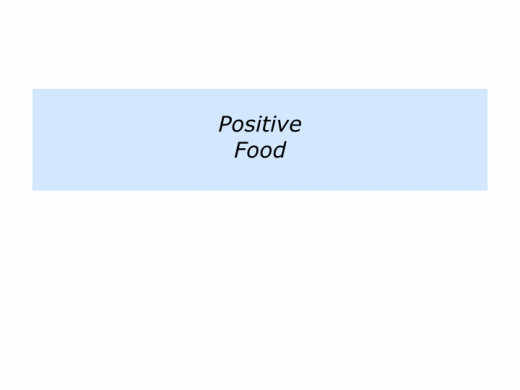
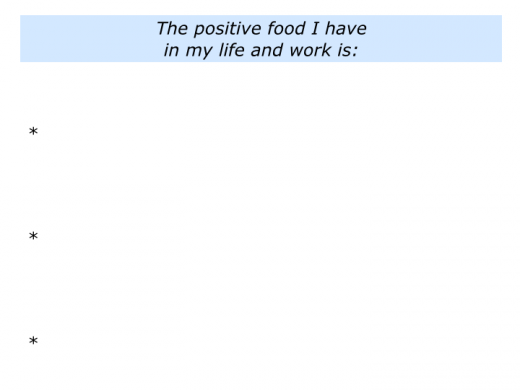
Poisonous Food
Is there any poisonous food that you experience in your life or work? One person took this literally. They said:
“For years I ate unhealthy food. My job involves long train journeys, often accompanied by bags of crisps, chocolate and fattening drinks.
“The wake-up call came from my doctor. He told me that I was overweight, but added the rider that he didn’t think I would do anything about it.
“Maybe that was the kick I needed. I aimed to prove him wrong and lost 8 kilos.
“Now I look after my diet, walk more often and feel much better within myself.”
What are the negative things that affect your system? You may choose, for example, to do some of the following things.
Listen to negative people … Eat tasteless food in hotels … Spend too many nights away from home … Work with dispiriting clients … Have back-to-back meetings during the day … Meet in windowless rooms … Feel out of control at work … Neglect your health.
If you wish, try tackling the exercise on this theme. This invites you to describe the potentially poisonous food you may sometimes experience in your life and work.
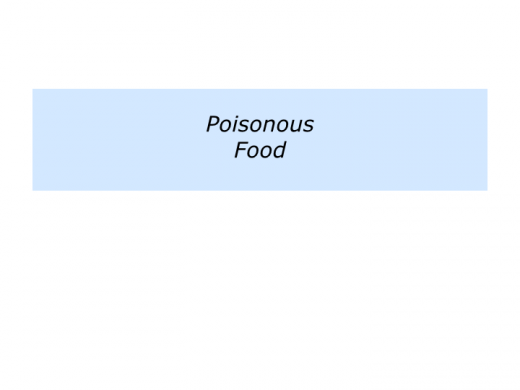
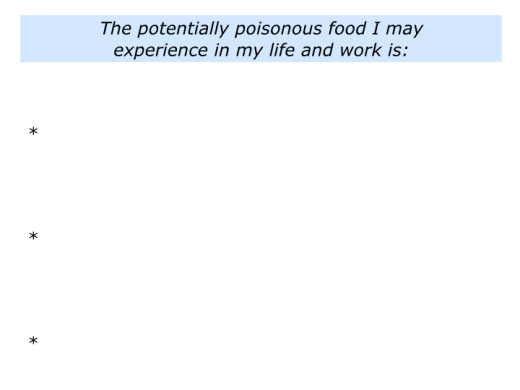
Positive Food
In The Future
There are many kinds of food that affect our systems. The old rule applies: “What we focus on, we become.”
People can choose to study many of the positive things happening around the world, for example, rather than listen to a constant diet of bad news put out by the traditional media.
They can study the work done by social enterprises to tackle some of humanity’s most pressing problems. These include organisations such as Ashoka, Acumen Fund, Skoll Foundation, Echoing Green and Schwab Foundation.
They can study the many educational projects that are helping young people to develop Twenty-First Century Skills. These skills include Clear Thinking, Creativity, Collaboration and Communication. Studying these is more uplifting than complaining about schools still geared to the Industrial Age.
People can also, if they wish, take small steps in their own lives. Tom Rath has written a fine book on this theme. Here are some extracts from a Question and Answer Session about Eat, Move, Sleep.

Q: What prompted you to write a book about health?
After writing business books for more than a decade, I realized that improving health is the biggest business challenge of our generation.
Nothing breaks household finances, corporate balance sheets, or national economies faster than poor health.
But the much larger reason why I decided to focus all of my time and energy on this topic is because I was tired of seeing people that I care about suffer unnecessarily and die early.
We are literally killing ourselves, sapping our energy, and destroying our wellbeing as a result of lousy decisions we make about our health each day.
Q: Why have you spent so much time studying this topic?
I first started doing this research to save my own life, literally.
While I have been reluctant to discuss this before, I have been battling cancer for more than twenty years now.
Ever since my diagnosis, I’ve spent time every day learning about specific things I can do to extend my odds of living a bit longer.
Over the last decade, I have focused more attention on helping friends, family, and colleagues to learn from these discoveries and lead healthier lives.
Q: What are some of the most important things you have learned from this research?
What I learned, not only about how to prevent cancer, but also how to prevent heart disease, diabetes, and obesity – is remarkably encouraging.
The vast majority of human disease and illness is preventable.
There are hundreds of specific, proven actions we can take to increase our odds of living longer and stronger.
What matters most are the small decisions we make each day, ones that give us more energy in the moment and also prevent illness in the future.
The second major finding is that these three elements – eating, moving, and sleeping – build on one another.
Eating right makes it easier to be active. Being active makes it easier to sleep. Sleeping well helps you to avoid bad foods, and so on.
As a result, working on all three at once is even easier than focusing on one area in isolation.
Q: Don’t we already know that we should be eating, moving, and sleeping better?
In Eat Move Sleep, I cover a lot of the essentials that people know they should be doing, but have trouble applying on a daily basis.
I like books that help me figure out how to apply things I already know but don’t do.
There are several things in the book I have known for a long time, yet did not practice myself until I learned new ways to connect short-term incentives with what is best for my long-term health.
Frankly, my biggest challenge in writing this book was narrowing down to the most practical findings for a broad audience, given the wealth of good science on these topics today.
You will, of course, have your own approach to taking care of your body and soul. One approach is to, as far as possible, plan your week ahead of time. You may then aim to, for example:
Get enough sleep … Organise your diary so you feel more in control … Spend time with stimulating customers … Do work where you can play to your strengths … Build in time for breaks between meetings.
Have small snacks of healthy food every couple of hours … Exercise several times a week … Play your favourite music … Spend time with stimulating people … Stay in charge of the media messages you take in.
If you wish, try tackling the final exercise on this theme. This invites you to do the following things.
Describe the specific things you can do to get more positive food – and avoid poisonous food – in the future.
Describe the specific benefits of doing these things.
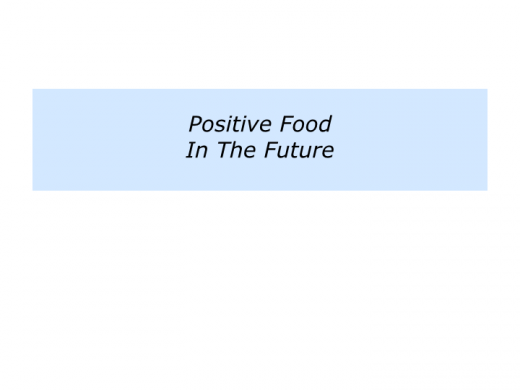
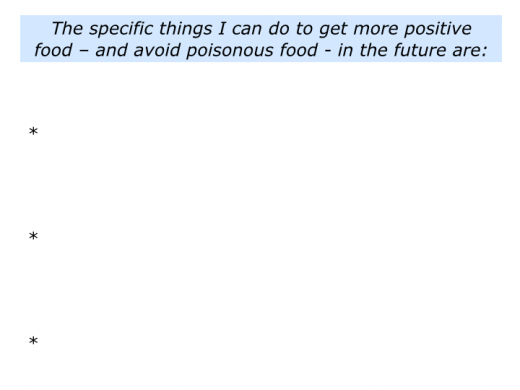
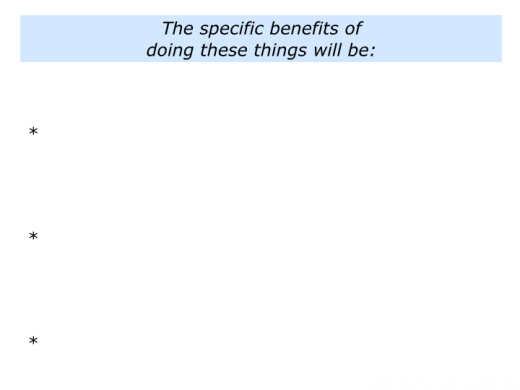






Leave a Reply